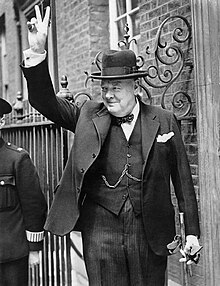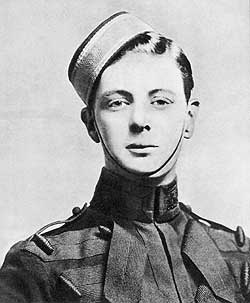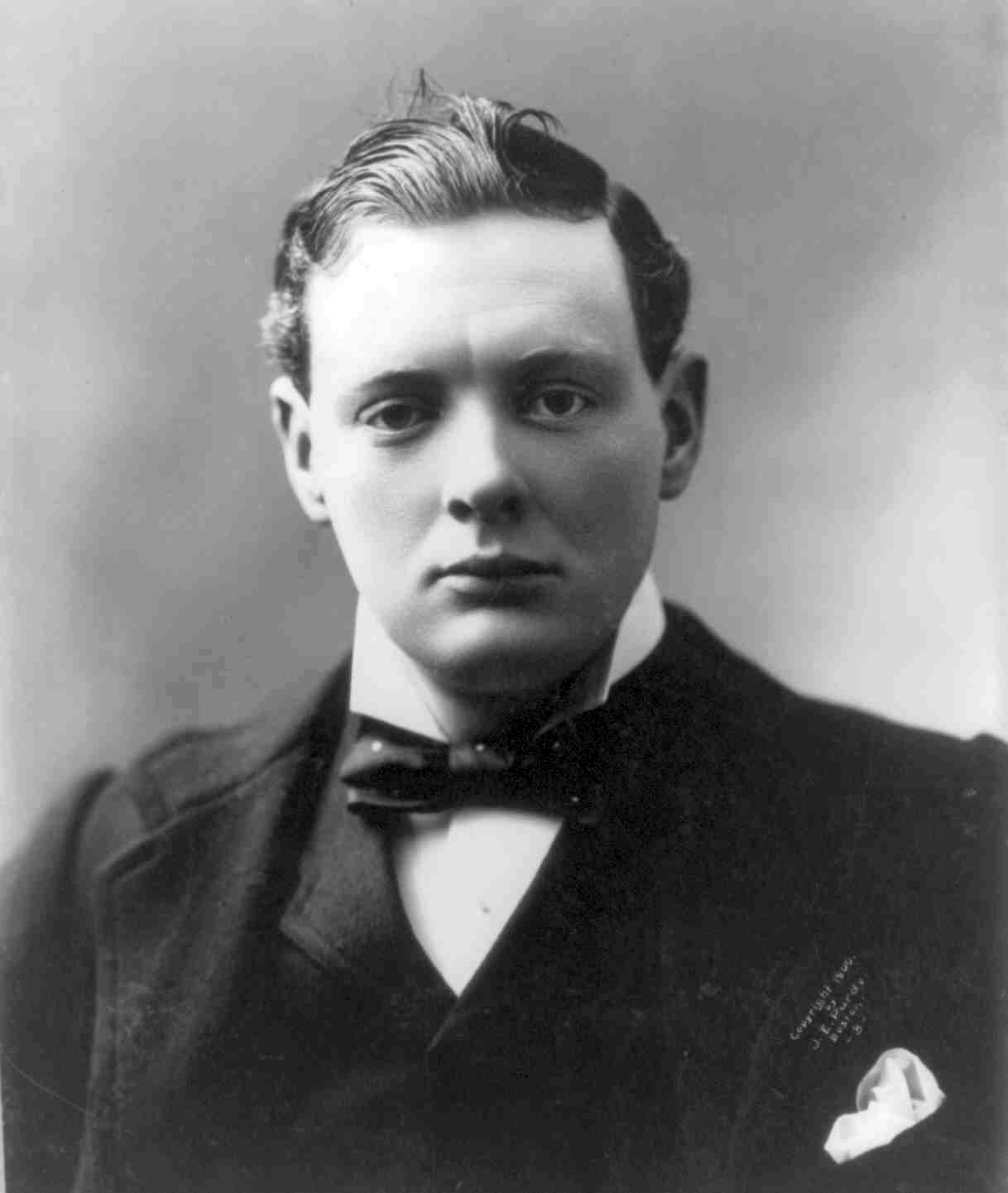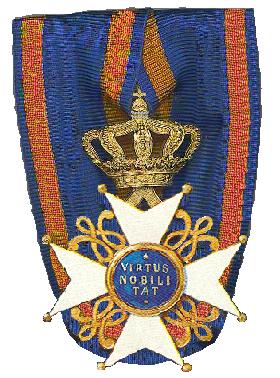Churchill, Sir Winston Leonard Spencer, born on 30-11-1874 in Blenheim, Oxfordshire  into the aristocratic family of the Dukes of Marlborough. A branch of the noble
into the aristocratic family of the Dukes of Marlborough. A branch of the noble  Spencer family. He was a descendant of the English general John Churchill, 1st Duke of Marlborough, who had been given Blenheim Palace as a reward for the victory at the Battle of Blenheim in 1704. Churchill’s father was Lord Randolph Henry Spencer-Churchill,
Spencer family. He was a descendant of the English general John Churchill, 1st Duke of Marlborough, who had been given Blenheim Palace as a reward for the victory at the Battle of Blenheim in 1704. Churchill’s father was Lord Randolph Henry Spencer-Churchill,  the third son of the seventh Duke of Marlborough, who was Chancellor of the Exchequer in 1886. Like his father, Churchill only used ‘Churchill’ as his surname, although he was officially registered as ‘Spencer-Churchill’. His mother was Jeanette “Jennie” Jerome,
the third son of the seventh Duke of Marlborough, who was Chancellor of the Exchequer in 1886. Like his father, Churchill only used ‘Churchill’ as his surname, although he was officially registered as ‘Spencer-Churchill’. His mother was Jeanette “Jennie” Jerome,
 into the aristocratic family of the Dukes of Marlborough. A branch of the noble
into the aristocratic family of the Dukes of Marlborough. A branch of the noble  Spencer family. He was a descendant of the English general John Churchill, 1st Duke of Marlborough, who had been given Blenheim Palace as a reward for the victory at the Battle of Blenheim in 1704. Churchill’s father was Lord Randolph Henry Spencer-Churchill,
Spencer family. He was a descendant of the English general John Churchill, 1st Duke of Marlborough, who had been given Blenheim Palace as a reward for the victory at the Battle of Blenheim in 1704. Churchill’s father was Lord Randolph Henry Spencer-Churchill,  the third son of the seventh Duke of Marlborough, who was Chancellor of the Exchequer in 1886. Like his father, Churchill only used ‘Churchill’ as his surname, although he was officially registered as ‘Spencer-Churchill’. His mother was Jeanette “Jennie” Jerome,
the third son of the seventh Duke of Marlborough, who was Chancellor of the Exchequer in 1886. Like his father, Churchill only used ‘Churchill’ as his surname, although he was officially registered as ‘Spencer-Churchill’. His mother was Jeanette “Jennie” Jerome,
 the daughter of American millionaire Leonard Jerome. Their two-year-old daughter Marigold in August 1921. He had one son Randolph Churchill
the daughter of American millionaire Leonard Jerome. Their two-year-old daughter Marigold in August 1921. He had one son Randolph Churchill
 who died age 57 on 06-06-1968, in East Bergholt. Winston Leonard Spencer-Churchill, like his father, used the surname “Churchill” in public life. Churchill attended the British boys’ boarding school Harrow. Young Churchill had a hard childhood at boarding school. He was called “copperknob” and “ginger” by his classmates because of his red hair. He was lonely and had little contact with his parents. Authority was always questioned by Churchill, so studying was a rarity for him. As a result, he got bad grades, especially in Latin and Mathematics. As a result, he was frequently punished by his teachers. Yet Churchill also had favorite subjects, such as history and literature, subjects in which he excelled and from which he would reap the benefits later in life.
who died age 57 on 06-06-1968, in East Bergholt. Winston Leonard Spencer-Churchill, like his father, used the surname “Churchill” in public life. Churchill attended the British boys’ boarding school Harrow. Young Churchill had a hard childhood at boarding school. He was called “copperknob” and “ginger” by his classmates because of his red hair. He was lonely and had little contact with his parents. Authority was always questioned by Churchill, so studying was a rarity for him. As a result, he got bad grades, especially in Latin and Mathematics. As a result, he was frequently punished by his teachers. Yet Churchill also had favorite subjects, such as history and literature, subjects in which he excelled and from which he would reap the benefits later in life.  Independent and rebellious by nature, Churchill generally did poorly in school, for which he was punished. He was educated at three independent schools: St. George’s School, Ascot, Berkshire; Brunswick School in Hove. He was rarely visited by his mother, and wrote letters begging her either to come to the school or to allow him to come home. His relationship with his father was distant; he once remarked that they barely spoke to one another. His father died on 24-01-1895, aged 45, leaving Churchill with the conviction that he too would die young and so should be quick about making his mark on the world. Churchill met his future wife, Clementine Hozier,
Independent and rebellious by nature, Churchill generally did poorly in school, for which he was punished. He was educated at three independent schools: St. George’s School, Ascot, Berkshire; Brunswick School in Hove. He was rarely visited by his mother, and wrote letters begging her either to come to the school or to allow him to come home. His relationship with his father was distant; he once remarked that they barely spoke to one another. His father died on 24-01-1895, aged 45, leaving Churchill with the conviction that he too would die young and so should be quick about making his mark on the world. Churchill met his future wife, Clementine Hozier,  in 1904 at a ball in Crewe House, On 12-09-1908, they were married in St. Margaret’s, Westminster. Their first child, Diana, was born in London on 11-07-1909.
in 1904 at a ball in Crewe House, On 12-09-1908, they were married in St. Margaret’s, Westminster. Their first child, Diana, was born in London on 11-07-1909.
After the pregnancy, Clementine moved to Sussex to recover, while Diana stayed in London with her nanny. Later she suffered from several nervous breakdowns and committed suicide, age 54 in 1963, she took an overdose of barbiturates.



Grave Diana. Grave Randolph. Grave of mother Clementine Hozier.
On 28-05-1911, their second child, Randolph, was born at 33 Eccleston. he died on 06-06-1968 from a heart attack, age 57. On 12-10-1899, the Second Boer War between Britain and the Boer Republics broke out and he obtained a commission to act as war correspondent for the Morning Post with a salary of £250 per month. Winston had a brief but eventful career in the army,  he became a Conservative Member of Parliament in 1900. At the outbreak of the Second World War, he was appointed First Lord of the Admiralty, a post which he had earlier held from 1911 to 1915. Churchill also served under David Lloyd George
he became a Conservative Member of Parliament in 1900. At the outbreak of the Second World War, he was appointed First Lord of the Admiralty, a post which he had earlier held from 1911 to 1915. Churchill also served under David Lloyd George 
 as Minister of War and Air (1919-20). In May 1940, he became Prime Minister and Minister of Defence and remained in office until 1945. He took over the premiership from Neville Chamberlain.
as Minister of War and Air (1919-20). In May 1940, he became Prime Minister and Minister of Defence and remained in office until 1945. He took over the premiership from Neville Chamberlain. 
 Churchill also developed a strong personal relationship with Franklin Delano Roosevelt
Churchill also developed a strong personal relationship with Franklin Delano Roosevelt
 he became a Conservative Member of Parliament in 1900. At the outbreak of the Second World War, he was appointed First Lord of the Admiralty, a post which he had earlier held from 1911 to 1915. Churchill also served under David Lloyd George
he became a Conservative Member of Parliament in 1900. At the outbreak of the Second World War, he was appointed First Lord of the Admiralty, a post which he had earlier held from 1911 to 1915. Churchill also served under David Lloyd George 
 as Minister of War and Air (1919-20). In May 1940, he became Prime Minister and Minister of Defence and remained in office until 1945. He took over the premiership from Neville Chamberlain.
as Minister of War and Air (1919-20). In May 1940, he became Prime Minister and Minister of Defence and remained in office until 1945. He took over the premiership from Neville Chamberlain. 
 Churchill also developed a strong personal relationship with Franklin Delano Roosevelt
Churchill also developed a strong personal relationship with Franklin Delano Roosevelt
 and this led to the sharing and trading of war supplies. His right hand was Harold MacMillan
and this led to the sharing and trading of war supplies. His right hand was Harold MacMillan 
 as British government representative to the Allies in the Mediterranean reporting directly to Prime Minister Winston Churchill. The Lend Lease agreement of March 1941 was forced in a series of interviews with Roosevelt. Churchill continued to be criticized for meddling in military matters and tended to take too much notice of the views of his friends, than his military commanders. In April 1941 he made the serious mistake of trying to save Greece by weakening his forces fighting the Desert War. One of the major contributions made by Churchill to eventual victory was his ability to inspire the British people to greater effort by making public broadcasts on significant occasions. After Pearl Harbour
as British government representative to the Allies in the Mediterranean reporting directly to Prime Minister Winston Churchill. The Lend Lease agreement of March 1941 was forced in a series of interviews with Roosevelt. Churchill continued to be criticized for meddling in military matters and tended to take too much notice of the views of his friends, than his military commanders. In April 1941 he made the serious mistake of trying to save Greece by weakening his forces fighting the Desert War. One of the major contributions made by Churchill to eventual victory was his ability to inspire the British people to greater effort by making public broadcasts on significant occasions. After Pearl Harbour  Churchill worked closely with Franklin D. Roosevelt to ensure victory over Germany and Japan. He was also a loyal ally of the Soviet Union after Adolf Hitler (see Hitler Paula) launched Operation Barbarossa on 22-06-1941. Despite intense pressure from Josef Stalin
Churchill worked closely with Franklin D. Roosevelt to ensure victory over Germany and Japan. He was also a loyal ally of the Soviet Union after Adolf Hitler (see Hitler Paula) launched Operation Barbarossa on 22-06-1941. Despite intense pressure from Josef Stalin 
 to open a second-front by landing Allied troops in France in 1943, Churchill continued to argue that this should not happen until the defeat of Nazi Germany was guaranteed. The D-Day landings
to open a second-front by landing Allied troops in France in 1943, Churchill continued to argue that this should not happen until the defeat of Nazi Germany was guaranteed. The D-Day landings  did not take place until June, 1944 and this delay enabled the Red Army to capture territory from Germany in Eastern Europe. On Victory in Europe Day, 08-05-1945, Churchill broadcast to the nation that Germany had surrendered and that a final cease fire on all fronts in Europe would come into effect at one minute past midnight that night.
did not take place until June, 1944 and this delay enabled the Red Army to capture territory from Germany in Eastern Europe. On Victory in Europe Day, 08-05-1945, Churchill broadcast to the nation that Germany had surrendered and that a final cease fire on all fronts in Europe would come into effect at one minute past midnight that night.

 The Japanese later surrendered on 15-08-1945. On 15-01-1965, Churchill suffered a severe stroke that left him gravely ill. Winston retired from politics in 1964 and spent much of his retirement at his home Chartwell in Kent.
The Japanese later surrendered on 15-08-1945. On 15-01-1965, Churchill suffered a severe stroke that left him gravely ill. Winston retired from politics in 1964 and spent much of his retirement at his home Chartwell in Kent.  He purchased it in 1922 after his daughter Mary was born. There was speculation that Churchill may have had Alzheimer’s disease in his last years, although others maintain that his reduced mental capacity was merely the result of a series of strokes. In 1963, US President John Fitzgerald Kennedy,
He purchased it in 1922 after his daughter Mary was born. There was speculation that Churchill may have had Alzheimer’s disease in his last years, although others maintain that his reduced mental capacity was merely the result of a series of strokes. In 1963, US President John Fitzgerald Kennedy,

 acting under authorization granted by an Act of Congress, proclaimed him an Honorary Citizen of the United States, but he was unable to attend the White House ceremony. Despite poor health, Churchill still tried to remain active in public life, and on St George’s Day 1964, sent a message of congratulations to the surviving veterans of the 1918 Zeebrugge Raid who were attending a service of commemoration in Deal, Kent, where two casualties of the raid were buried in the Hamilton Road Cemetery.
acting under authorization granted by an Act of Congress, proclaimed him an Honorary Citizen of the United States, but he was unable to attend the White House ceremony. Despite poor health, Churchill still tried to remain active in public life, and on St George’s Day 1964, sent a message of congratulations to the surviving veterans of the 1918 Zeebrugge Raid who were attending a service of commemoration in Deal, Kent, where two casualties of the raid were buried in the Hamilton Road Cemetery. 
Death and burial ground of Churchill, Sir Winston Leonard Spencer.








On 15-01-1965, Churchill suffered a severe stroke that left him gravely ill. He died at his London home nine days later, at age 90, on the morning of Sunday 24-01-1965, 70 years to the day after his father’s death. (see Did you know) Winston is buried with his wife Clementine, born Spencer, who died old age 92, in 1977, on the Saint Martin’s Churchyard, in Bladon, England.

Message(s), tips or interesting graves for the webmaster: robhopmans@outlook.com























Paul Hart
St MARTIN’s – not St MARTINE’s is the location of Churchill’s grave.